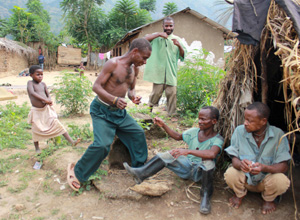30th January 2012:
The Basua people, a little known Ugandan tribe of just one hundred people, is facing the threat of extinction, IRIN news reported last week. According to IRIN, the Basua were forcibly removed from their forest home two decades ago. They have also struggled to cope with modern life and have been ravaged by health crises, including HIV.
Uganda has two indigenous forest communities – the Batwa people of the southwest, a larger group originally from Rwanda and Burundi, and the Basua in the west who came from the neighbouring Democratic Republic of Congo (DRC).
Already marginalized for their short stature and for being traditional forest dwellers, the Basua have continued to receive less assistance than the Batwa because they are more geographically isolated and have a smaller population, numbering just 100.
Forced resettlement
Western Uganda’s Semliki Forest – the historical home of the Basua – became a National Park in 1993, and as a result, the community has lost its hunter-gatherer existence. They now have to request permission to fish and collect medicinal herbs and firewood, and are forbidden from hunting.
The Basua have been moved around ever since, most recently to a village outside the small trading town of Bundimasoli in 2007, after a local NGO won a grant from the European Union to build a village for them, but the project collapsed under corruption allegations before it was completed.
The community still has no clear rights to the land where it was resettled, and struggles to access basic services such as clean drinking water and healthcare. “…Imagine someone is used to maybe going to the office, working, making phone calls, going to the ATM, withdrawing money… then you dump them in the forest instead,” said Fred Lulinaki, a programme director at the East and Central Africa Association for Indigenous Rights (ECAAIR). “If they survive, it will be just by luck.” he added.
Some Basua men and women find casual jobs such as hauling wood, but most sit around the village with nothing to do. Some have turned to alcohol. Of the 40 children, Lulinaki said only two attend school, either because they are orphaned or their parents cannot afford the cost of pens and school fees. Fifteen of the community’s children are orphans.
Ezekiel Mugisa, local coordinator of the Organisation for the Survival of the Basua (OSIBA), said the first documented case of HIV among them was in 1985, but the virus really established a foothold when the Allied Democratic Forces – a Ugandan rebel group – launched a movement to overthrow the Ugandan government for the DRC in the mid-1990s. The Ugandan troops sent to fight the insurgents set up camp near the Basuas’ home; soldiers and suppliers offered money and goods in exchange for sex with Basua women, or raped them.
Rumours have long circulated in Uganda that sex with Basua women cured back pain and HIV. Stan Frankland, an anthropologist at Scotland’s University of St Andrews, has been working with and advocating for the community since he first visited them as a tourist in 1990. He helped establish OSIBA.
Frankland said the myths stemmed from a belief that as forest dwellers, the Basua “have some spiritual aspect to them. That they’re not fully human… they might transmit this power.” Even with the troops gone and education campaigns debunking supposed AIDS cures, transactional sex remains common. For many women, it is the only viable way of supporting themselves. HIV is a secondary concern to getting enough to eat.
There are no official statistics on HIV prevalence among the Basua. Those who know they are HIV-positive have limited access to, or knowledge of available treatments. Since Save the Children pulled out recently, the nearest source of treatment is a health centre 20km away – few of the Basua can afford the transport costs.
Even when they did have access to ARVs, there was no formal process to teach people why the drugs were important or how to take and store them. Instead, many would trade the drugs for food, according to Mugisa.
“…The [Basua] are dying,” said Basua King Geoffrey Nzito, who had just concluded a burial ceremony. “I want people to join hands so at least they can come to a solution that is good for us.” he said.
“…The [Basua] are dying,” said Basua King Geoffrey Nzito, who had just concluded a burial ceremony. “I want people to join hands so at least they can come to a solution that is good for us.” he said.
Powerlessness
The Basuas’ situation mirrors the problems indigenous groups around the world are facing, says Rebecca Adamson, president and founder of First Peoples Worldwide (FPW), a group that makes small, direct grants to indigenous groups to help carry out livelihood projects that they design and develop.
Adamson said she had seen many indigenous groups kicked off land they had lived on and cultivated for hundreds of years, so that governments and companies could access it for mining, industry or tourism. Once they are displaced, there is little funding to help the groups integrate into life outside the forests.
The funding that exists is often driven by NGOs without the input of the indigenous people, so they “remain at the whims of what western society wants for them instead of what they want for themselves”, she said. Adamson is afraid that “we will be seeing large-scale extinction of certain groups” like the Basua.
Stan Frankland also said the Basua fear that the community would soon die out. “…There are only 100 of them. If you can’t save 100 people, how are you going to make it work on a larger scale?” END: Please login to www.ugandacorrespondent.com every Monday to read our top stories and anytime mid-week for our news updates.


No comments:
Post a Comment